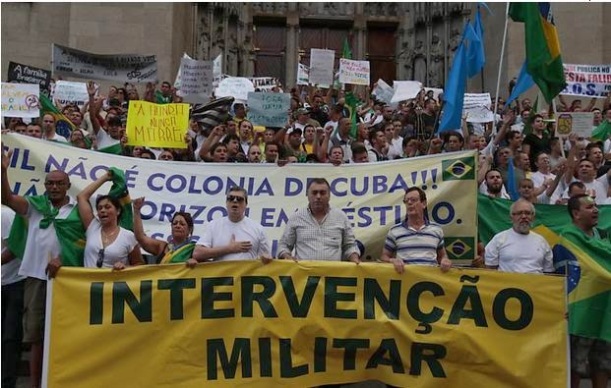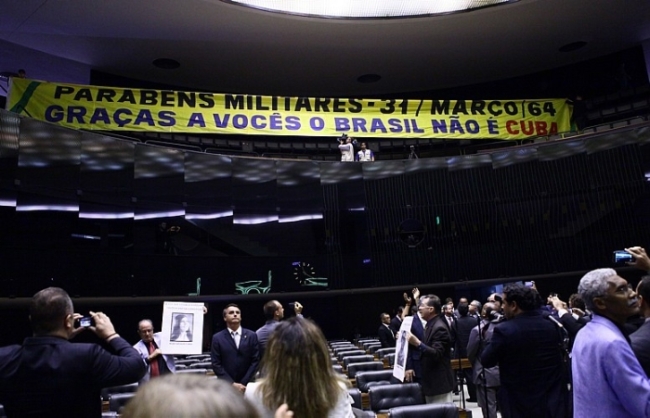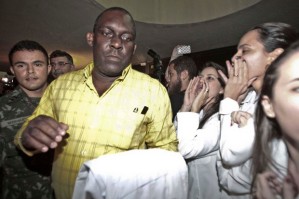An engagement in Rio has ended after 26-year-old carioca Nina Mandin caught husband-to-be Rafael Hermida mistreating her two French bulldogs. Mandin became suspicious after the dogs became scared of Hermida; mysterious wounds also started appearing on the animals. To get to the bottom of things, she installed a hidden camera in her living room, which subsequently recorded images of Hermida headbutting one of her dogs before picking the other one up by its paw, swinging it round and throwing it to the floor. Mandin uploaded the video to Facebook where it has been viewed nearly 300,000 times and provoked widespread outrage. The story has been covered by major newspapers such as O Globo and Folha de S. Paulo, it appeared on TV Globo’s popular daytime TV show Mais Você and has drawn condemnation from various (in my view, opportunistic) celebrities.
Unsurprisingly, Mandin has kicked her fiancé out and cancelled their wedding, while he has also been summoned by the police to make a statement and may face animal cruelty charges. However, beyond that, there are several other consequences Hermida is facing which are arguably less deserved. He part owns a bar in Rio, which has received threats, and his partners are taking legal action to remove him from the business. Predictably, he has also received a torrent of abuse and a number of death threats. He published a statement on Instagram in his defence (rather foolishly I thought), but I’d be surprised if he ventures out much in public over the next week or two.
A similar case took place last August in Porto Alegre, when Patrícia Moreira da Silva, a 23-year-old Grêmio fan, was caught on camera at a Copa do Brasil match racially abusing Aranha, the Santos goalkeeper. The images, which were filmed by an ESPN TV camera and then widely circulated on television and online, clearly show her yelling the word macaco (monkey). As in Hermida’s case, there were a series of official consequences. Grêmio were immediately disqualified from the competition, while Moreira da Silva was summoned by the police and may face prosecution under racial hatred laws (though it is unlikely she will go to prison). She was banned from entering any football stadium for 720 days and she also lost her job. All of which, arguably, is fair enough. Less so, were the numerous death and rape threats she received online, her house being pelted with stones and set on fire, and the fact that she had to go into hiding outside Porto Alegre.
Without for one second wishing to defend Hermida or Moreira da Silva, or diminish their crimes, there is something about the way both of them have been treated which makes me deeply uncomfortable. Both cases seem symptomatic of a very recent trend, which nonetheless has its roots in an ancient (perhaps timeless) human behaviour. This is mob justice for the digital age. Offenders are no longer just punished: they are put in the stocks, ritually humiliated, made an example of. This is especially true of Moreira da Silva: several other Grêmio fans participated in the racist chanting and were summoned by the police, but not one of them was subject to the same treatment as her. The only difference is that she got caught on camera.
It is true that the justice system in Brazil is notoriously flawed. There are a lot of people rotting in prison who shouldn’t be there at all, while there are many people who have committed extremely serious crimes and got off scot-free. Some might argue therefore, that in the absence of an effective criminal justice system, it is fair and correct that some people who commit these sorts of crimes are made an example of online and in the media. Not only does this ensure that they face consequences for their actions, it also serves as a warning to others. However, while not only is it unfair to single people out in this manner (as in the Moreira da Silva case), this kind of trial by Facebook seems to lead inevitably to reprisals and vigilantism.
Last May, for example, an angry mob composed of around 100 people in Guarajá, on the São Paulo coast, lynched a young mother-of-two named Fabiane Maria de Jesus. Her crime? Some local residents thought she resembled a photofit circulated online of a woman who was supposedly kidnapping children to use in black magic rituals. But there was no such woman. The whole story was nothing more than a rumour that had snowballed on social networks, encouraged by the website Guarujá Alerta, which published the photofit. It later emerged that the photofit had been produced by the Rio de Janeiro police in an entirely unrelated case two years beforehand.
One might argue that this case is different, given that Maria de Jesus was innocent of any crime (unlike Hermida and Moreira da Silva). But I think that’s irrelevant, given that the problem was one of mistaken identity. Appointing internet social networks our judge, jury (and in this case) executioner, creates an extremely dangerous precedent. Maria de Jesus’ fate could befall any of us. We need only to have the misfortune of resembling some internet bogeyman, or, worse still (this is where it gets really scary), have the misfortune of having some total stranger think we do.
And do we really want to bestow any moral legitimacy on the social networks? Perhaps it has always been this way, but I have the strong impression that internet discourse is becoming increasingly shrill and demented and aggressive. It’s like the chorus in a Greek tragedy, or the yokels in some Hardy novel – only far more vicious and histrionic. In Hermida’s case, as well as the threats and the abuse, one man posted a video in which he weeps (weeps!) with pity for Mandin’s dogs. People seem to lose all perspective online, tending to alight on emotive individual cases, while completely failing to see the bigger picture. Is Moreira da Silva’s treatment by the media and social networks likely to help resolve the problem of racism in Brazilian football stadiums? Perhaps, in the short term, but in the long term, I doubt it. But why limit the discussion to football stadiums? Why not try and approach the much more pressing problem of racism in Brazilian society as a whole? Might it be because such a problem requires thought and analysis and research, rather than just weeping and wailing and the gnashing of teeth?
Some might argue that this kind of thing will gradually lead to a higher standard of behaviour. The treatment of Hermida and Moreira da Silva will serve as a warning to others; after all, you never know when someone might be filming you. But aside from the obvious Orwellian implications of this argument, I just don’t think it works in practice. Most human beings are not that rational. No doubt there are people who commit awful crimes with cold analysis and foresight, but for most of us, I think the worst things we do are precisely when we are not thinking, and therefore, not concerned about what is happening around us and if someone might happen to have a smartphone handy.
Perhaps what I find most disturbing about these sorts of incidents is the way people seem so quick to judge and punish and condemn. We are all human, and therefore imperfect. We are all prone to lapses of behaviour. What was it that bloke with the beard and sandals used to say? Something about sin and casting stones. Apparently he’s a major player in Brazil. Isn’t there a statue of him around here somewhere?



